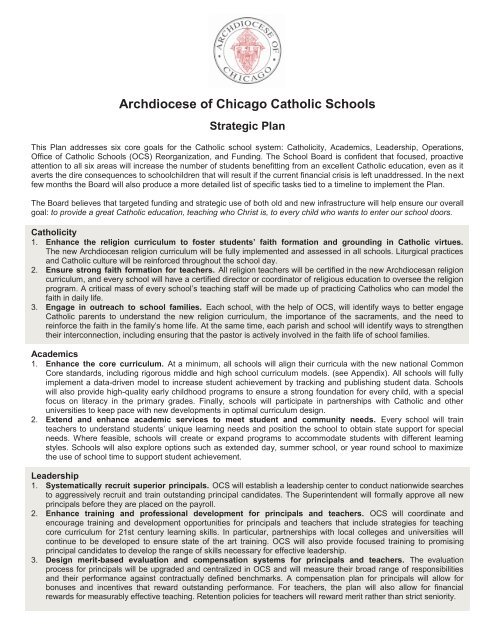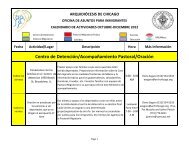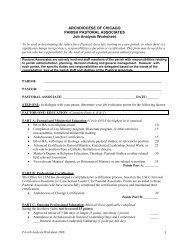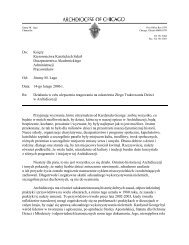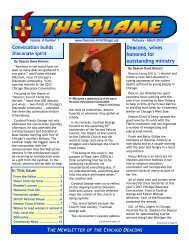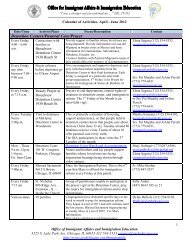Archdiocese of Chicago Catholic Schools
Archdiocese of Chicago Catholic Schools
Archdiocese of Chicago Catholic Schools
Create successful ePaper yourself
Turn your PDF publications into a flip-book with our unique Google optimized e-Paper software.
<strong>Archdiocese</strong> <strong>of</strong> <strong>Chicago</strong> <strong>Catholic</strong> <strong>Schools</strong>Strategic PlanThis Plan addresses six core goals for the <strong>Catholic</strong> school system: <strong>Catholic</strong>ity, Academics, Leadership, Operations,Office <strong>of</strong> <strong>Catholic</strong> <strong>Schools</strong> (OCS) Reorganization, and Funding. The School Board is confident that focused, proactiveattention to all six areas will increase the number <strong>of</strong> students benefitting from an excellent <strong>Catholic</strong> education, even as itaverts the dire consequences to schoolchildren that will result if the current financial crisis is left unaddressed. In the nextfew months the Board will also produce a more detailed list <strong>of</strong> specific tasks tied to a timeline to implement the Plan.The Board believes that targeted funding and strategic use <strong>of</strong> both old and new infrastructure will help ensure our overallgoal: to provide a great <strong>Catholic</strong> education, teaching who Christ is, to every child who wants to enter our school doors.<strong>Catholic</strong>ity1. Enhance the religion curriculum to foster students’ faith formation and grounding in <strong>Catholic</strong> virtues.The new Archdiocesan religion curriculum will be fully implemented and assessed in all schools. Liturgical practicesand <strong>Catholic</strong> culture will be reinforced throughout the school day.2. Ensure strong faith formation for teachers. All religion teachers will be certified in the new Archdiocesan religioncurriculum, and every school will have a certified director or coordinator <strong>of</strong> religious education to oversee the religionprogram. A critical mass <strong>of</strong> every school’s teaching staff will be made up <strong>of</strong> practicing <strong>Catholic</strong>s who can model thefaith in daily life.3. Engage in outreach to school families. Each school, with the help <strong>of</strong> OCS, will identify ways to better engage<strong>Catholic</strong> parents to understand the new religion curriculum, the importance <strong>of</strong> the sacraments, and the need toreinforce the faith in the family’s home life. At the same time, each parish and school will identify ways to strengthentheir interconnection, including ensuring that the pastor is actively involved in the faith life <strong>of</strong> school families.Academics1. Enhance the core curriculum. At a minimum, all schools will align their curricula with the new national CommonCore standards, including rigorous middle and high school curriculum models. (see Appendix). All schools will fullyimplement a data-driven model to increase student achievement by tracking and publishing student data. <strong>Schools</strong>will also provide high-quality early childhood programs to ensure a strong foundation for every child, with a specialfocus on literacy in the primary grades. Finally, schools will participate in partnerships with <strong>Catholic</strong> and otheruniversities to keep pace with new developments in optimal curriculum design.2. Extend and enhance academic services to meet student and community needs. Every school will trainteachers to understand students’ unique learning needs and position the school to obtain state support for specialneeds. Where feasible, schools will create or expand programs to accommodate students with different learningstyles. <strong>Schools</strong> will also explore options such as extended day, summer school, or year round school to maximizethe use <strong>of</strong> school time to support student achievement.Leadership1. Systematically recruit superior principals. OCS will establish a leadership center to conduct nationwide searchesto aggressively recruit and train outstanding principal candidates. The Superintendent will formally approve all newprincipals before they are placed on the payroll.2. Enhance training and pr<strong>of</strong>essional development for principals and teachers. OCS will coordinate andencourage training and development opportunities for principals and teachers that include strategies for teachingcore curriculum for 21st century learning skills. In particular, partnerships with local colleges and universities willcontinue to be developed to ensure state <strong>of</strong> the art training. OCS will also provide focused training to promisingprincipal candidates to develop the range <strong>of</strong> skills necessary for effective leadership.3. Design merit-based evaluation and compensation systems for principals and teachers. The evaluationprocess for principals will be upgraded and centralized in OCS and will measure their broad range <strong>of</strong> responsibilitiesand their performance against contractually defined benchmarks. A compensation plan for principals will allow forbonuses and incentives that reward outstanding performance. For teachers, the plan will also allow for financialrewards for measurably effective teaching. Retention policies for teachers will reward merit rather than strict seniority.
Operations1. Fully implement the FAST program. OCS will require all schools receiving Archdiocesan grants to comply with theFAST protocols and will facilitate that compliance. These protocols include hiring stronger principals andstrengthening programs where necessary, designating a marketing staff member to increase enrollment, settingrealistic tuition rates and instituting variable rates, and instituting financial best practices. OCS will set concretebenchmarks to assess schools’ compliance with FAST over time and make case by case decisions about the future<strong>of</strong> schools that do not comply. OCS will also move from a grant model <strong>of</strong> assistance to these schools to aneed-based scholarship model.2. Continue the AIM program <strong>of</strong> centralized OCS management <strong>of</strong> certain schools. OCS will continue the AIM pilotprogram under which OCS has assumed direct operating authority over certain schools. While pastors and Vicarsmay continue to voluntarily request AIM status, some FAST schools will be encouraged or required to move to theAIM program if they fall behind on compliance with FAST protocols.3. Transition high schools to newly formed associations <strong>of</strong> the Christian faithful. OCS will also encourage thecreation <strong>of</strong> lay boards to take over governing authority and financial responsibility for the seven high schoolscurrently under OCS jurisdiction.4. Create a long-term budget and investment plan for pragmatic use <strong>of</strong> physical infrastructure. OCS will helpschools identify immediate health and safety issues in school buildings so that they can be addressed. OCS willestimate the deferred and ongoing maintenance and capital repair needs <strong>of</strong> school buildings and make realisticrecommendations about the best use <strong>of</strong> buildings going forward.OCS Reorganization1. Establish senior leadership support for the superintendent. OCS will implement the new organization chart byappointing highly qualified Senior Managers whose responsibilities track the priorities <strong>of</strong> this plan (<strong>Catholic</strong> Identity,Academics, Operations and Finance). OCS will hire highly qualified personnel as necessary to fill these positions.2. Upgrade field leadership and support (i.e., Field Team Leaders; marketing and finance team members). OCSwill appoint highly qualified Field Team Leaders, who have both education and business skills, with responsibility forthe success <strong>of</strong> an assigned group <strong>of</strong> schools. OCS will create targeted teams for each FAST school consisting <strong>of</strong> theassigned Team Leader, a marketing advisor, and a financial advisor, and will hire additional highly qualifiedpersonnel as necessary to fill these positions.3. Further develop the partnership between OCS and the Big Shoulders Fund. OCS will plan cooperatively withthe Big Shoulders Fund for strategies to ensure the long-term viability <strong>of</strong> the schools supported by the Fund.Funding1. Conduct an aggressive fundraising campaign to cover projected deficits. A high-pr<strong>of</strong>ile fundraising campaignwill be conducted among major donors, parishes, and the broader civic community. An endowment for needs-basedscholarships will be created from campaign proceeds to assist families with tuition. This fund will be segregated andadministered transparently by OCS, which will also change its direct funding model from a grant-based program to aneeds based scholarship program. Other proceeds <strong>of</strong> the campaign will be used for additional OCS personnel toimplement this Plan and for prudently identified capital repairs and improvements.2. Continue to promote legislative action and public policies that would make public financial support availableto <strong>Catholic</strong> school families. The School Board and OCS will continue to mobilize support for school choicelegislation in Illinois (e.g., a statewide scholarship program funded by corporate and individual tax credits, a voucheror credit program for families earning less than $50,000 a year).3. Foster more equitable support for schools across the Archdiocesan system. OCS will urge the consideration <strong>of</strong>new ways to shape policies within the <strong>Archdiocese</strong> so that new sources <strong>of</strong> funds to support the schools are identifiedwithin the parish system that reflect the benefits <strong>of</strong> <strong>Catholic</strong> education to the entire Church.For more information, visit: schools.archchicago.orgVersion 1: July 23, 2012


